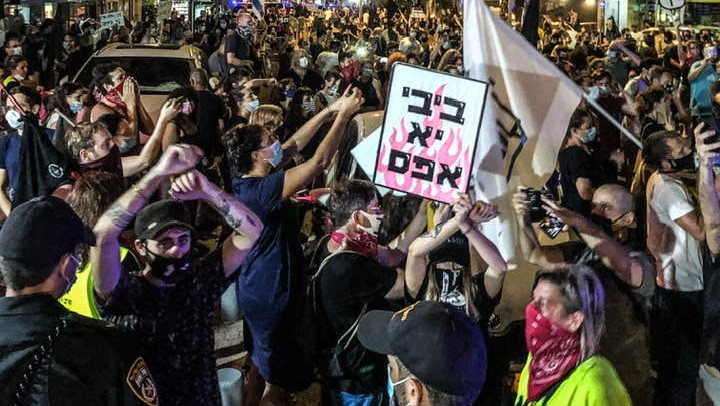Several hundred protesters marched through the streets of Tel Aviv on Wednesday night, September 30, among them activists from Hadash and the Communist Party of Israel (CPI), demonstrating against the far-right government and the new anti-democratic legislation aimed at limiting protests during the current coronavirus lockdown. The protesters set out from Habima Square and marched through major roads of the coastal city for several hours.

Police attempt to stop the demonstration on Ben Yehuda Street in Central Tel Aviv on Wednesday night, September 30. The small sign in the foreground reads: “Bibi, you’re a nothing.” (Photo: Crime Minister)
Police arrested four demonstrators Itay Raviv, Avichai Green, Shai Sadeh and Tal Sadot, for allegedly “assaulting officers and interfering with them while performing their duty.” “Three of the four were falsely arrested for causing public unrest; an unfounded violation that was not committed by any of them,” the detainees’ solicitor, Attorney Daniel Haklai told the Jerusalem Post. “It seems that they exposed undercover officers within the crowd that was suffering retaliation” from law enforcement agents. The fourth detainee, Itay Raviv, was reportedly arrested on suspicion of assaulting Israel Police’s Central Tel Aviv precinct deputy-commissioner.
The protest came hours after the government approved new emergency regulations banning Israelis from traveling over one kilometer from their homes to attend a protest, and limiting outdoor gatherings to capsules no larger than 20 persons.
Early Wednesday morning, the Knesset voted 46 to 38 to limit demonstrations against Prime Minister Benjamin Netanyahu to 20 participants. According to the new regulations, protests are allowed within a one-kilometer radius from one’s place of residence. The law effectively stifles the large weekly demonstrations at far-right Prime Minister Benjamin Netanyahu’s official residence in Jerusalem and is slated to enter into effect on Thursday.
Dozens also demonstrated on Wednesday evening outside the Prime Minister’s residence on Balfour Street, which has been the center of recent protests against Netanyahu over his indictment on graft charges and handling of the pandemic. Two protesters were detained there for blocking the road, according to the organization Crime Minister.
Hours after the law was passed, the Movement for Quality Government in Israel challenged it in the High Court of Justice, in the hope that the court would freeze the legislation pending judicial oversight, and eventually strike it down. The court ruled that the government had until October 7 to respond to the petition, but declined to issue a stay on the law. In the petition, the organization argued that the new law hamstrings “one of the fundamental rights in a democracy” and insists, “Health concerns do not form the basis of the amendment to the law.” They maintain that the amendment was driven by Netanyahu’s desire to minimize the demonstrations against him.
Related:


